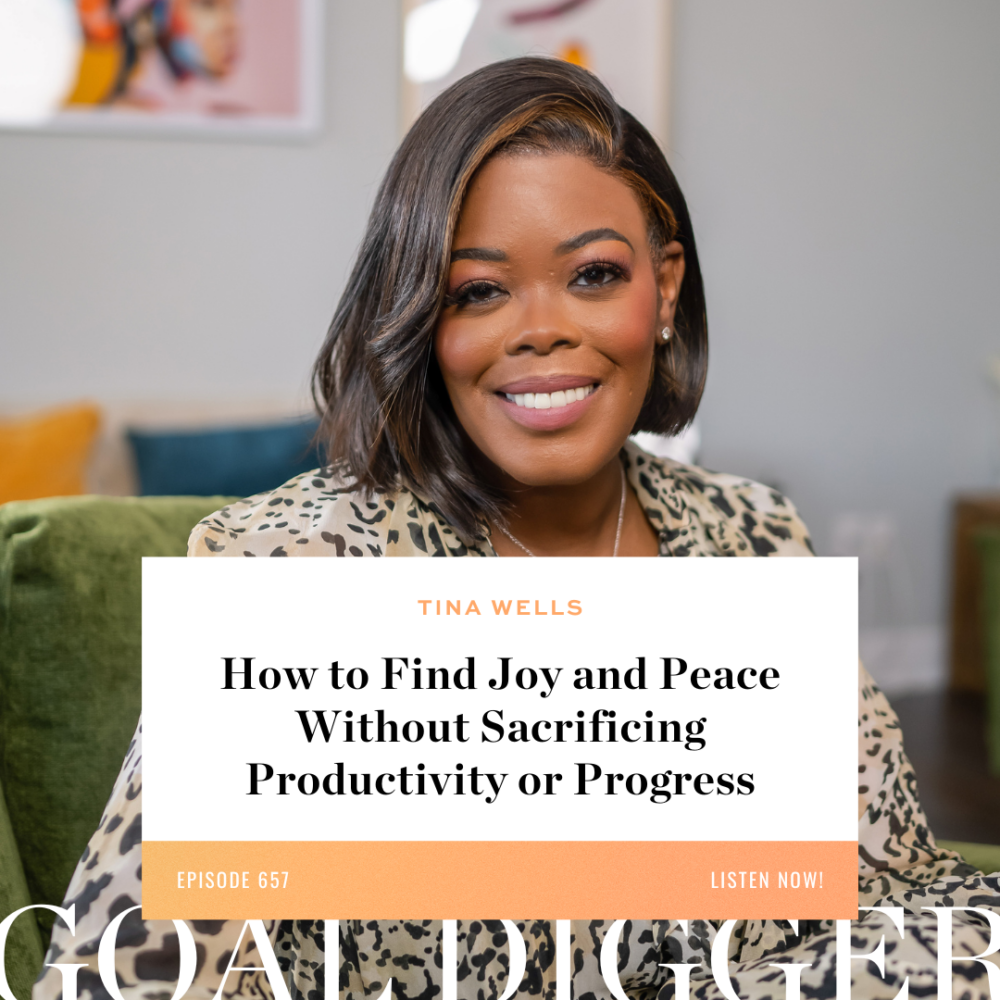
Apple Podcasts | Spotify | Stitcher
You know by now that I am not a person in pursuit of “balance” – I want blend. I want my life as a mother and as an entrepreneur and as Jenna, the human, to blend together so that I can show up as my full self wherever I am, never having to segment or compartmentalize who I am or what I love. Today’s guest has a similar philosophy, and it’s the concept of work-life harmony.
Tina Wells’s story is so interesting and so inspiring. She turned a business that she launched when she was just a teenager into an award-winning marketing agency, led boardroom meetings as the youngest (and sometimes only) Black woman in the room, and pursued her childhood dream of traveling around the world. Now, Tina is a business strategist, advisor, author, and founder. Through it all, she’s crafted a method for maintaining work-life harmony, that is, she doesn’t forgo joy and peace for productivity, and that’s something I can get behind.
In her new book, The Elevation Approach, she shares her four-phase plan for work-life harmony, a flexible and foolproof technique that helps you meet your goals without sacrificing joy for productivity and progress. That’s what we’re digging into in this episode.
Harmony Not Balance
Tina Wells dove right into her perspective on work-life harmony. According to her, the idea of balance is outdated, and what we should strive for is harmony. She explains that harmony means that all the things in our life work together, even if it means fitting in things we love amidst our busy schedules. She believes that this kind of life is available to everyone if we let go of the notion of balance and embrace the idea of harmony.
Tina shared her experience of burnout at the age of 27, 11 years after starting her business. She realized that she was in a cycle of preparation and inspiration, and was neglecting the other two phases of her Elevation Approach: recreation and transformation.
Wells emphasized that the idea of rest and taking a break from work was counter-cultural, especially with the concept of hustle culture, where working tirelessly is celebrated. However, the pandemic has made us realize that there is another way to approach work and life balance. The pandemic allowed people to work from home, take breaks during the day, and spend more time with their families, which gave them a sense of harmony in their work and home life.
Wells also mentioned that balance is not achievable, as it suggests that the more someone works, the more they have to play. Instead, she believes in a harmonious life where everything works together. For instance, taking a break during a busy work month does not necessarily mean adding more tasks but figuring out how to fit them in with other things that they want to do.
Origins of the Elevation Approach
Tina shared a personal experience about her father’s health scare, which made her think about what it means to be truly happy and content in life. She realized that her father found joy in his daily routines and rituals, and this inspired her to create her own set of principles for achieving happiness and success. This led her to develop her 12 principles of Instant Elevation which she details in depth in her book The Elevation Approach.
Tina emphasized the importance of intentionally creating daily rituals to improve mental and emotional wellbeing. She believes that by developing these habits, we can elevate our lives and achieve a greater sense of harmony. She also stressed the need to let go of things that no longer serve us, whether it be toxic relationships or unfulfilling jobs, and to focus on what truly matters in our lives.
Ultimately, she encourages everyone to take control of their lives and prioritize their own happiness. She believes that by doing so, we can achieve a sense of contentment and fulfillment that extends beyond our personal lives and positively impacts our professional pursuits as well. As she put it, “The Elevation Approach is really about taking control of your life and creating a life that you love.”
The Elevation Approach in Practice
The Elevation Approach evolved from her experience teaching a program called Leadership in the Business World to students at The Wharton School. The approach consists of those four phases Tina mentioned earlier: Preparation, Inspiration, Recreation, and Transformation.
In the Preparation phase, you must do the hard work of decluttering your space, getting curious, and knowing the numbers before deciding whether to move forward with an idea.
The Inspiration phase is where you seeks social validation and feedback on your idea from friends and those who have had similar experiences. Rather than immediately moving on to execution, the Recreation phase emphasizes the importance of taking a break and doing something unrelated to the big idea to avoid burnout.
The Transformation phase brings everything together, and you can move forward with the big idea with renewed energy and focus.
Tina emphasizes the importance of work-life harmony, not just for entrepreneurs but also for women in general and those dedicated to their families. The Elevation Approach helps individuals bring big ideas to life faster by following a process that avoids burnout and focuses on achieving work-life harmony.
More from This Conversation
If you are striving for work-life harmony versus the elusive “balance”, this is a conversation for you. Press play on the full episode wherever you get your podcasts.
Connect with Tina Wells online at tinawells.com, on Instagram @tinawells, and pick up her book The Elevation Approach to apply the principles to your life and business.




